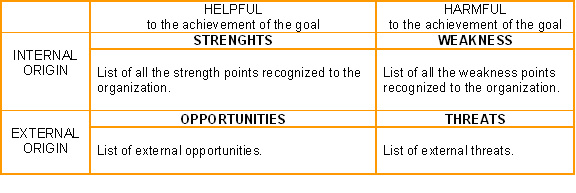Difference between revisions of "SWOT Analysis"
From Learning and training wiki
Chantal joly (Talk | contribs) |
Chantal joly (Talk | contribs) |
||
| Line 6: | Line 6: | ||
== ''' Headings'''== | == ''' Headings'''== | ||
| − | #'''Strengh''' : | + | #'''Strengh''' : An internal competence, valuable resource or attribute that an organization can use to maintain, build, leverage, and exploit the external environment. |
| − | #'''Weakness''' : | + | #'''Weakness''' : An internal lack of competence, resource or attribute that an organization can |
| − | #'''Opportunity''' : | + | #'''Opportunity''' : . |
| − | #'''Threat''' : | + | #'''Threat''' : . |
<ref>[http://www.deza.ch www.deza.ch] (29 September 2008)</ref> | <ref>[http://www.deza.ch www.deza.ch] (29 September 2008)</ref> | ||
Revision as of 17:26, 3 October 2008
| A tool that identifies the Strengths, Weaknesses, Opportunities and Threats of an organization. Specifically, SWOT is a basic, straightforward model that assesses what an organization can and cannot do as well as its potential opportunities and threats. The method of SWOT analysis is to take the information from an environmental analysis and separate it into internal (strengths and weaknesses) and external issues (opportunities and threats). Once this is completed, SWOT analysis determines what may assist the organization in accomplishing its objectives, and what obstacles must be minimized to achieve desired results. [1] |
|
Headings
Step by Step
SWOT MatrixJob Aids |
References
- ↑ www.answers.com (20 August 2008), www.netmba.com (20 August 2008), en.wikipedia.org (20 August 2008)
- ↑ www.deza.ch (29 September 2008)
- ↑ www.quickmba.com (13 August 2008), Wikipedia (13 August 2008), Project Cycle Management Guidelines, European Commission, 2004
